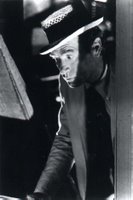It hasn't made it to the local CBC website (cbc.ca/nl), but
Here and Now, the local supper hour show reported on Friday that there were at least five companies interested in taking over the Harbour Breton fish plant.
You can find the broadcast
here, if you have RealPlayer.
Bill Barry did an end-run around the process by working directly with Danny Williams, and in the process secured government financial support for his mink-farming and aquaculture projects.

Elsewhere, there are reports that Barry needs a quota of 50, 000 tonnes of caplin to use in the Harbour Breton plant which will now supply fishmeal to his mink and salmon farms. The existing total caplin quota in Newfoundland and Labrador is 30, 000. Barry reportedly wants access to an offshore quota in division 3NO.
In the Telegram story reprinted below, note that provincial fish minister Tom Rideout indicates he would expect any increased caplin quota to be allocated to inshore fishermen. By implication that means not to a plant operator like Bill Barry or to deep sea fish harvesting interests.
That division covers a mass of caplin that spawn on the southeast shoal of the Grand Banks. Caplin normally spawn on beaches but this stock continues to spawn on the shoal, presumably as a left-over behaviour from a time when the shoal was actually above water.
This story grows more interesting with each day as new information comes to light.
-------------------------------
Saturday, February 18, 2006
Caplin data scarce BY JAMIE BAKER - The Telegram
Provincial Fisheries Minister Tom Rideout said any caplin allocations made as part of the Barry Group plan for Harbour Breton will have to be based on science -— period.
Rideout was responding to questions related to Bill Barry'’s request for what is believed to be a 50,000-tonne caplin quota as part of the Harbour Breton plan -— a quota that nearly doubles the entire inshore allocation of just over 30,000 tonnes for the whole province in 2004.
Rideout says the stocks Barry is focused on are not inshore stocks, but instead an offshore 3NO stock that, he said, hasn'’t been fished for many years.
He also insisted that any decision to grant quotas for Harbour Breton or anywhere else would not be based on politics.
"“He'’s talking about a 3NO stock - that'’s the context he'’s talking about and that'’s the context we would support — an offshore caplin allocation for him to be used in Harbour Breton,"” Rideout told The Telegram.
"“The only caveat I would put on supporting an allocation for anybody, including Bill Barry, is that it be based on good, sound, solid science. This is all driven by science.
"“There may be opportunities offshore, and it was offshore that was the word used in Barry's plan. He didn'’t mention inshore, and he didn'’t mention any zone in particular."”
Whether inshore or offshore, Opposition Liberal Leader Gerry Reid said 50,000 tonnes is an awful lot to ask.
"“It concerns me in that Barry is looking for an increase of about 140 per cent in caplin quota -— that'’s unheard of.
"“The only thing you'’ve ever seen increase that much is the price of a barrel of oil,"” Reid said. "“In talking to officials at DFO (Department of Fisheries and Oceans), there'’s very little scientific data collected in recent years to indicate there should be an increase in caplin quota."”
Reid is also concerned about the precedent it would set if a processor, like Barry, were granted a caplin quota.
"“I'’m not aware in the history of this province that there'Â’s been a Canadian or Newfoundland company to have ever received a caplin quota -— maybe back in the 1970s or something, but I'’m not aware there'’s ever been an over-65-foot caplin fishery in Canadian waters,"” Reid said.
"“Even if there were an increase in the caplin quota, normally, it'’s the inshore fishermen, those under 65 feet, who would get first dibs on that."”
Decisions on fish stock management are not made overnight, according to Tom Curran, the chief of resource management with DFO. Deciding whether to increase or decrease quotas on any stock, he said, requires detailed advice from stakeholders and, especially, DFO'’s science branch.
Most of the caplin science Curran said he is aware of is based largely on inshore stocks.
"“The Newfoundland fishery is based on the inshore stock - — in the bays around the island,"” he said. "“There has not been an offshore for the last 20 or 25 years that I'’m aware of."”
On Friday, a March 2003 report from the Newfoundland and Labrador all-party committee on the 2J3KL and 3Pn4RS cod fisheries surfaced.
Moratorium urgedThe report showed that several members of the current government -— including Premier Danny Williams and Rideout, along with Trevor Taylor, Loyola Hearn, Bill Matthews, Norm Doyle, Roger Grimes, and others  - had signed off on a recommendation in the report to place a moratorium on the commercial caplin fishery.
That news has Reid charging the premier with having short-term memory.
"“The premier is on the record saying this Barry plan for Harbour Breton has been around for some 14 months -— if that'’s the case they put very little thought into the plan, because the premier should have remembered that the year prior to that he was part of an all-party committee that recommended there be no commercial caplin fishery because of the importance of caplin in the recovery of the cod stocks,"” Reid said.
Rideout dismissed the notion, claiming several of the people involved in that all-party committee report backed off on the caplin moratorium recommendation shortly after the report was released.
"“A number of members of the committee disassociated themselves from the Gulf part of that recommendation,"” Rideout said. "“Those members thought that recommendation, with no science to base it on, was probably a bit too onerous and should not be given as much weight as first thought."”
The most recent science on the Gulf stock, Rideout noted, suggests the numbers are strong.
Whether or not there is an increase in that region remains to be seen, but Rideout said caplin stocks offshore and in the Gulf are, essentially, unrelated in terms of granting quotas.
"“In the Gulf, if there'’s going to be an enhanced caplin quota in that area I would think it would be certified inshore fishermen who would land the quota,"” Rideout said.
"“If you'’re fishing an offshore quota in 3NO, the equipment to fish that would very likely be larger, just under 65 feet or even larger."”
Reid maintains the turmoil at Harbour Breton could have been prevented. He said had the province stopped FPI from taking its quotas when it left Harbour Breton, "“we wouldn'’t be discussing the matter today."”
And he fears desperation could lead to rash decision-making in terms of granting all-important caplin and herring quotas essential to the Barry plan for Harbour Breton.
"“The premier could solve this using the FPI Act -— he didn'’t, and now finds himself in a box,"” Reid said.
"“So, he called on his passionate friend Mr. Barry and asked him for help in Harbour Breton and when Mr. Barry heard that, he said, '‘yes, Virginia there is a Santa Claus'’ and he put forward his wish list."”
jbaker@thetelegram.com



